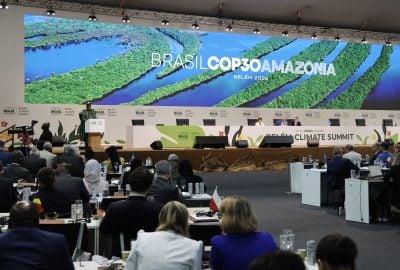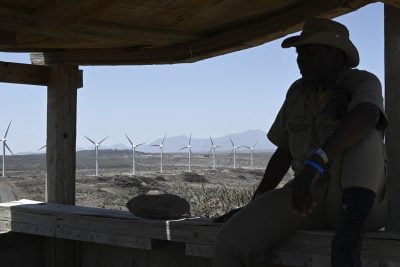If global temperatures continue to rise, and governments fail to meet their policy pledges, natural disasters will accelerate in Africa, hampering most countries’ economic growth, says Understanding Africa’s Climate Risks, a recent study by Oxford Economics Africa.
Under the report’s “No Further Action” scenario – in which no climate adaptation or mitigation policies are implemented – countries with annual temperatures above 15°C will experience an exponential deterioration in productivity growth.
Ghana, for instance, has a projected average temperature of 28°C in 2050 and will suffer one of the biggest hits to economic growth, with GDP levels at least 24.3% lower than baseline levels by 2050.
Other “warm countries” in danger of economic contractions include (from most to least affected): Botswana, Mozambique, Tanzania, Nigeria, Zambia, Uganda, Mauritius, South Africa, and Kenya.
“As the academic research on climate change is constantly evolving, our estimates may be underestimating the real economic impact of rising temperatures on those countries’ economies,” says Felicity Hannon, associate director at Oxford Economics Africa.
“African countries’ average temperatures are well above 15°C – in a range from 25°C to 30°C – which means that any further rise in temperature from where we are today will harm their GDPs.”
What chances for a net zero scenario?
Fuel exporting countries are projected to be better off than others in a No Further Action scenario in which they benefit from the continued demand for fossil fuels, while they would be worse off in the “Net Zero” scenario as the demand for the commodities collapses.
Under a Net Zero scenario, the world’s CO2 emissions will sharply decline from the second half of the century, with Sub-Saharan Africa accounting for only 5.8 % despite representing 18% of the world’s population.
From a regional perspective, carbon emissions will be more equally distributed, although Nigeria, Mozambique, Tanzania, and Zimbabwe are expected to hold significant shares of the continent’s total CO2 emissions.
Countries such as Kenya and Uganda, which are attractive for green investment due to their large renewable capacities, or Zambia and Mozambique, which have large reserves of key metals and minerals, are set to profit from transitioning away from fossil fuels and carbon-intensive modes of production.
The firm says that Zambia’s terms of trade are projected to increase by 27 percentage points in 2030 as a result of a surge in copper prices.
“All African countries would be worse off if the temperature continues to rise but the extent to which they would be affected varies accordingly to the state of their economies,” says Hannon.
Continent-wide, Oxford Economics Africa argues that, under a net zero scenario, revenues will flourish everywhere, but long-term vision is required.
“As the physical impacts of climate change are very much concentrated on the second half of the century, we do need to think in the long-term,” says Hannon.
“The worst offenders of carbon emissions are the least affected by climate variability hence trying to make people think long-term is a huge task.”
$2.7 trillion global annual investment needed
The high vulnerability of the continent to climate change disasters is partly explained by its relatively poor financial capacity to adapt and mitigate those risks.
The International Energy Agency (IEA) estimates that, in an ambitious Net Zero scenario, $2.7 trillion of global annual investment is needed in the energy sector by 2030, roughly double current investment levels.
“That gap is even bigger in Africa,” says Hannon. “As we are heading towards Cop27 in Egypt, what we need to think about is how do we unlock investment in emerging economies.”
According to Oxford Economics Africa, 50% of global energy investment will come from the private sector, while the other half will be funded by governments through carbon tax revenues.
Want to continue reading? Subscribe today.
You've read all your free articles for this month! Subscribe now to enjoy full access to our content.
Digital Monthly
£8.00 / month
Receive full unlimited access to our articles, opinions, podcasts and more.
Digital Yearly
£70.00 / year
Our best value offer - save £26 and gain access to all of our digital content for an entire year!
 Sign in with Google
Sign in with Google 



